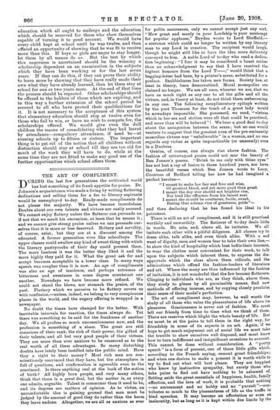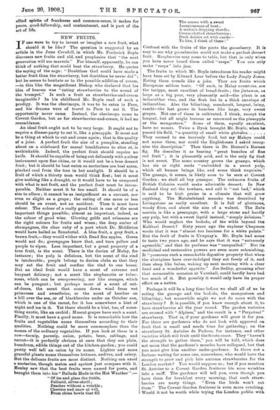THE ART OF COMPLIMENT.
DURING the last few generations the cultivated world has lost something of its frank appetite for praise. Dr. Johnson's acquaintance who made a living by writing flattering dedications and selling-them for a fee to literary aspirants would be unemployed to-day. Ready-made compliments do not please the majority. We have become incredulous. Doubts about our own talents and virtues are easily aroused. We cannot enjoy flattery unless the flatterer can persuade us, if not that we merit his encomium, at least that he means it ; and we cannot give strong praise unless we can persuade our- selves that it is more or less deserved. Bribery and servility, of course, exist; but they are at a discount among the educated. A former generation were like schoolboys. The upper classes could swallow any kind of sweet thing with which the literary pastrycooks of their day could present them. The more luscious it was the better they liked it and the more highly they paid for it. What the great aek for and accept becomes acceptable in a lower class. In many ways speech was rougher than it is now. An age of compliments was also an age of insolence, and perhaps extremes of bitterness and sweetness in some degree counteract one another. Nowadays we have become more refined. We could not stand the blows, nor stomach the praise, of the past. Flattery which we perceive to be flattery covers us with confusion,—unless, indeed, we belong to very conspicuous places in the world, and the sugary offering is wrapped in a newspaper.
No doubt the times have changed for the better. With inevitable intervals for reaction, the times always do. Yet there was something to be said for the frankness of another day. We all profess so much unconsciousness now, and the profession is something of a sham. The great are still conscious of their rank, the rich of their power, the gifted of their talents, and all but very good people of their virtues. They are more than ever anxious to be reassured as to the real worth of all these advantages. So many disturbing doubts have lately been instilled into the public mind. Have they a right to their money? Most rich men are con- scientiously convinced that they have, but the atmosphere is full of questions, and confirmation is agreeable even to the convinced. Is there anything real at the back of the notion of birth ? All highly born people, and very many others, think that there is a great deal, but the matter is, as every one admits, arguable. Talent is commoner than it used to be, and its degrees are matters of opinion. As to virtue, an uncomfortable idea is gaining ground that men must be judged by the amount of good they do rather than the harm they leave undone. Altogether, we are all as anxious as ever for polite assurances, only we cannot accept just any sort. "How great and manly in your Lordship is your contempt for popular applause," Dryden wrote to Lord Sheffield,—
a sentence which could no longer be written by any literary man to any Lord in creation. The recipient would laugh,
though he might still like to have the idea more delicately
conveyed to him. A noble Lord of to-day who read a dedica- tion beginning : "I fear it may be considered a boast rather than an acknowledgment to say that I have received the highest honours from the Lord T—," would think that a begging-letter had been, by a printer's error, substituted for a preface. Snobbishness has taken new forms. Society has, at least in theory, been democratised. Moral monopolies are claimed no longer. We are all sure, whoever we are, that we
have as much right as any one to all the gifts and all the virtues, and, in theory at least, do not think them unbecoming in any one. The following complimentary epitaph written by the poet Thomson for the tomb of a great lady would be nowadays impossible. She possessed, we read, "virtues which in her sex and station were all that could be practised, and more than will be believed" ! We bear a good deal to-day about the antagonism between the sexes ; but no one would venture to suggest that the greatest even of the pre-eminently masculine virtues was " unbelievable " in a woman, and no one regards any virtue as quite impracticable (or unseemly) even in a Duchess.
Genius, of course, can always rise above fashion. The fashion of extravagant praise could not mar the beauty of Ben Jonson's poems. "Drink to me only with thine eyes" has not lost a ray of lustre in three hundred years, nor have the beautiful verses which Ben Jonson wrote to Lucy, Countess of Bedford telling her how he had imagined a perfect heroine-
" I meant to make her fair and free and wise, Of greatest blood, and yet more good than great. I meant the day star should not brighter rise, Nor lend like effluence from his lucent seat. I meant she should be courteous, facile, sweet, Hating that solemn vice of greatness, pride"— and then declaring that he has found his ideal in his patroness.
There is still an art of compliment, and it is still practised worthily and unworthily. The flatterer of to-day deals little in words. He acts, and, above all, he imitates. We all imitate each other with a pitiful diligence. All classes try to
dress alike, talk alike, and even think alike. With a sad • want of dignity, men and women fear to take their own line,—
to show the kind of hospitality which best befits their incomes, to wear the clothes most convenient for their work, to talk upon the subjects which interest them, to express the die- approvals which the class above them ridicule, and the admirations which offend the fashion-loaders of literature and art. Where the many are thus influenced by the fashion of imitation, it is not wonderful that the few become flatterers. Clinging to individuals who are, as they think, above' them, they study to please by all permissible means, find new methods of offering incense, and by copying closely proclaim their sense of their model's perfection.
The art of compliment may, however, be well worth the
study of all those who value the pleasantness of life above its pleasures. Graciousness is never out of fashion. We must
tell our friends from time to time what we think of them. There are reserves which blight the whole beauty of life. But we must be at the pains to tell them in the right way, for friendship in some of its aspects is an art. Again, if we hope to get much enjoyment out of social life we must take the trouble to show ourselves well disposed, and must know how to turn indifferent and insignificant occasions to account.
This cannot be done without consideration. A " pretty
speech " is a form of present, one of those little gifts which, according to the French saying, cement great friendships; and when one desires to make a present it is worth while to
try to find out what will best please. They are happiest who know by instinctive sympathy, but surely those who
take pains to find out have nothing to be ashamed of. Setting aside the great essentials of happiness, health, family affection, and the love of work, it is probable that nothing —no amusement and no hobby and no " pursuit "—con• tributes so much to the pleasantness of life as the traffic in kind speeches. It may become an affectation or even an insincerity, but as long as it is kept within due limits by the
allied spirits of frankness and common-sense, it makes for peace, good-fellowship, and contentment, and is part of the art of life.











































 Previous page
Previous page